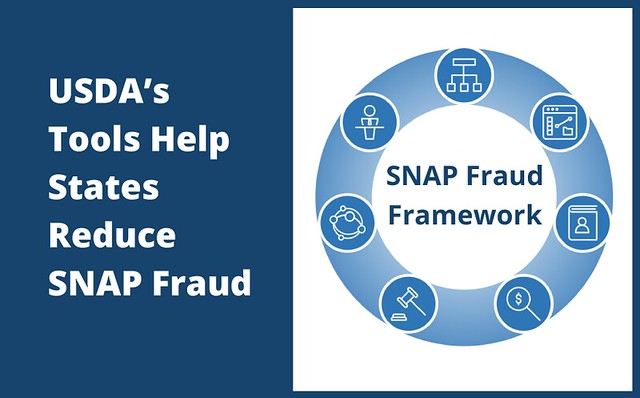
As Americans, we care about our neighbors in need, and we also expect that the nutrition assistance benefits we pay for with hard-earned tax dollars are used as intended – to put food on the table. Public trust is a central part of USDA’s mission. To help meet that mission, the Department recently released the Supplemental Nutrition Assistance Program (SNAP) Fraud Framework (PDF, 216 KB) to provide states with new and innovative resources to help combat recipient fraud and benefit trafficking.
The new SNAP Fraud Framework is a toolkit designed to help states prevent and detect fraud, and sharpen their investigative techniques. It combines tested, real-life strategies and innovations that states can learn from, plus concepts and practices from various industries and academia, so that even states that already have advanced fraud processes can continue to improve.
Just as important, the Framework also recognizes that each state faces unique challenges. It is designed as a flexible tool that provides states with a range of options that they can use to meet the unique needs of their participants, while working to eliminate recipient fraud. In SNAP, state agencies are responsible for identifying and taking action against recipients who commit fraud, while the federal government is responsible for monitoring and holding accountable retailers who break the rules.
But no matter how successful these strategies, let’s be clear: the job of protecting taxpayer dollars is never done because fraud is constantly evolving. We’re committed to ensuring that every tax dollar is used wisely to preserve these vital benefits for participants who play by the rules and need help putting food on the table. It’s a responsibility we share with our state and local partners, and more broadly with retailers authorized to accept benefits and the participants who receive them. Ultimately, all those involved in nutrition assistance programs – at the federal, state, and local levels – are accountable to the American taxpayer.
As we continue to make progress, USDA will identify more ways to expand and improve our efforts to combat fraud in the delivery of these critical nutrition assistance benefits and build upon the new SNAP Fraud Framework to help provide states with the up-to-date tools they need.


